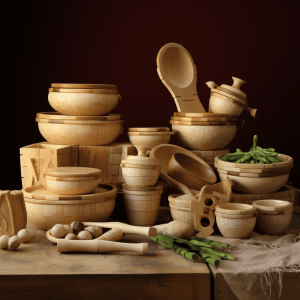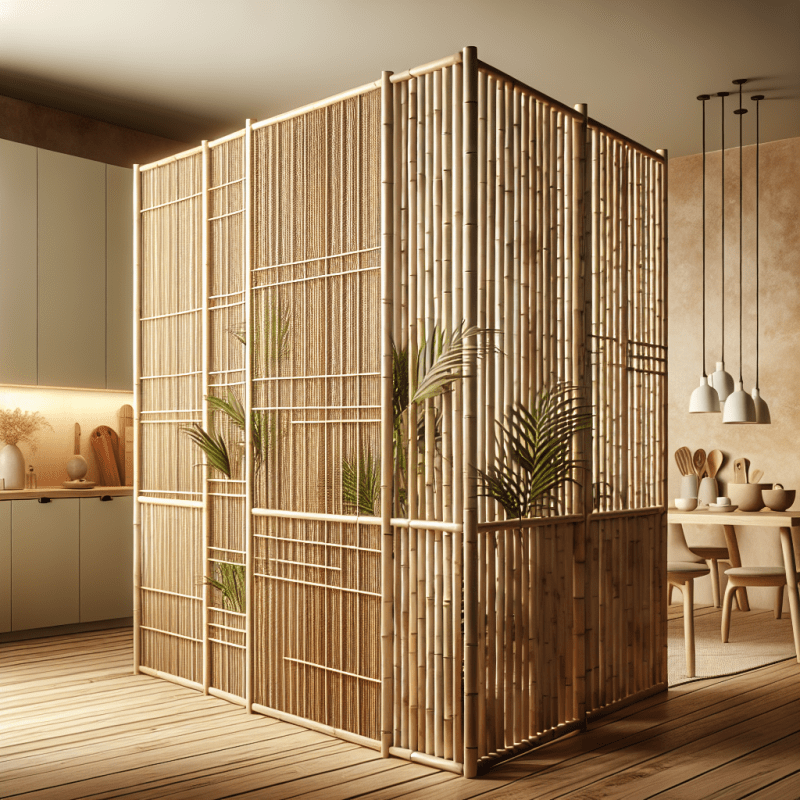In recent years, the use of bamboo in kitchen design and construction has experienced a remarkable resurgence. This eco-friendly material has proven to be a versatile and elegant solution for creating a sustainable and harmonious kitchen space. Bamboo is a fast-growing plant that requires minimal water and no harmful pesticides. This makes it an excellent choice for environmentally conscious homeowners who strive for a green lifestyle.
One key benefit of using bamboo in the kitchen is its acoustic properties. Unlike hard surfaces such as granite or stainless steel, bamboo absorbs sound effectively, reducing echoes and creating a calmer atmosphere. The natural texture and grain of bamboo also add an element of warmth and coziness to the kitchen, making it a welcoming space for family and friends to gather.
Furthermore, bamboo brings a touch of natural elegance to any kitchen design. With its smooth and sleek finish, it can be used for kitchen cabinets, countertops, and even flooring. Its light color and unique patterns create a visually appealing space that seamlessly blends with various design aesthetics, from modern and minimalist to rustic and traditional.
Finally, bamboo is exceptionally durable and long-lasting. It can withstand the demands of a busy kitchen, resisting scratches, dents, and even moisture better than many other hardwood materials. This makes bamboo an ideal choice for busy households where the kitchen sees a lot of activity.
Unleashing the Power of Bamboo: Enhancing Acoustics
The use of bamboo in interior design has gained popularity in recent years, and for good reason. Not only does bamboo bring a touch of natural elegance to any space, but it also possesses unique acoustic properties that can greatly enhance the overall sound quality within a room. In particular, bamboo has been found to effectively absorb and diffuse sound waves, creating a more pleasant auditory experience.
When it comes to kitchen design, acoustics are often an overlooked aspect. However, the constant clattering of pots and pans, the hum of kitchen appliances, and the echoes that bounce off hard surfaces can create a chaotic soundscape. This is where bamboo can play a transformative role. By introducing bamboo elements, such as bamboo flooring, bamboo wall panels, or bamboo ceiling treatment, the acoustics of a kitchen can be greatly improved.
Bamboo's natural acoustic properties stem from its unique structure. The tall, hollow culms of bamboo naturally absorb sound, reducing echoes and reverberation in a space. Additionally, bamboo fibers have a high density, allowing them to effectively block and dampen sound waves, minimizing sound transmission between rooms. By utilizing bamboo in kitchen design, homeowners can create a more peaceful and harmonious environment, where conversations can be easily heard and the overall auditory experience is enhanced.
Natural Beauty and Functionality: Bamboo in Modern Kitchens
Bamboo, known for its natural elegance and durability, has become a popular choice for transforming kitchen acoustics in modern interior design. Not only does it add a touch of sophistication and natural beauty to any kitchen, but it also offers a range of functional benefits that make it an ideal material for this space.
One of the primary reasons bamboo is sought after in modern kitchens is its exceptional acoustic properties. Its dense fibers and unique structural makeup absorb sound waves, reducing noise and echoes within the kitchen. This creates a more comfortable and peaceful environment while preparing meals or engaging in conversations with family and friends. Bamboo's ability to dampen sound also makes it an excellent choice for open-concept kitchen designs where noise often travels more freely.
In addition to its acoustic benefits, bamboo is a sustainable and eco-friendly option. Unlike traditional hardwoods, bamboo grows rapidly and can be harvested in as little as three to five years. Its rapid growth makes it a highly renewable resource, meaning that using bamboo in kitchen design has a minimal impact on the environment. Choosing bamboo over other materials not only adds natural elegance to the kitchen but also contributes to a greener and more sustainable lifestyle.
Beyond its aesthetic appeal and environmental benefits, bamboo is also known for its remarkable durability and strength. Its solid structure and natural resistance to moisture, pests, and daily wear and tear make it an excellent choice for kitchen countertops, cabinets, flooring, and even utensils. Bamboo withstands high usage and remains intact for years, ensuring that your kitchen maintains its elegance and functionality for a long time.
Creating a Tranquil Kitchen Oasis: Bamboo Acoustic Innovations
In today's fast-paced world, the kitchen has become more than just a place to prepare meals. It has evolved into a gathering spot, a hub for socializing, and a sanctuary for relaxation. To transform your kitchen into a tranquil oasis, consider incorporating bamboo acoustic innovations. Bamboo, known for its natural elegance and sustainable qualities, can revolutionize your kitchen's acoustics and create a soothing atmosphere.
Bamboo offers exceptional sound absorption properties, making it an ideal material for reducing noise in the kitchen. The fibrous structure of bamboo helps to dissipate sound waves, minimizing echo and reverberation. By incorporating bamboo wall panels or ceiling coverings, you can significantly reduce unwanted noise, creating a peaceful environment for cooking and conversations.
Furthermore, bamboo's aesthetic beauty adds a touch of natural elegance to your kitchen. Its warm hues and unique grain patterns bring a sense of serenity and harmony to the space. Whether used as a flooring material, cabinetry, or even as an accent wall, bamboo instantly elevates the visual appeal of your kitchen, creating a soothing ambiance that promotes relaxation and well-being.
Not only does bamboo enhance the acoustic and visual aspects of your kitchen, but it is also an eco-friendly choice. Bamboo is a rapidly renewable resource, with its plants reaching maturity in as little as three to five years. Its cultivation requires no harmful pesticides or chemicals, making it a sustainable alternative to traditional wood materials. By choosing bamboo acoustic innovations, you contribute to a greener future while enjoying the benefits of a tranquil kitchen oasis.
4.38 out of 5 starsBamboo Cookware
Sustainable and Stylish Cookware to Elevate Your Kitchen Experience
Product information
Product Review Score
Product links


